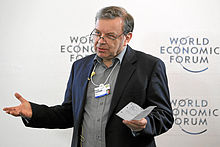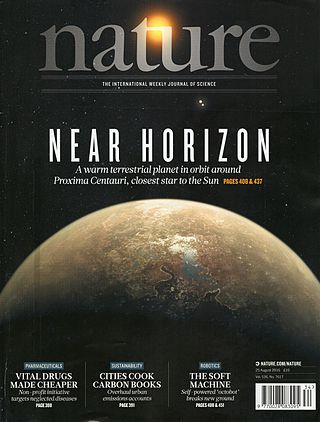
Nature is a British weekly scientific journal founded and based in London, England. As a multidisciplinary publication, Nature features peer-reviewed research from a variety of academic disciplines, mainly in science and technology. It has core editorial offices across the United States, continental Europe, and Asia under the international scientific publishing company Springer Nature. Nature was one of the world's most cited scientific journals by the Science Edition of the 2022 Journal Citation Reports, making it one of the world's most-read and most prestigious academic journals. As of 2012, it claimed an online readership of about three million unique readers per month.
Water memory is the purported ability of water to retain a memory of substances previously dissolved in it even after an arbitrary number of serial dilutions. It has been claimed to be a mechanism by which homeopathic remedies work, even when they are diluted to the point that no molecule of the original substance remains, but there is no theory for it.
Sir Mark Edward Welland, is a British physicist who is a professor of nanotechnology at the University of Cambridge and head of the Nanoscience Centre. He has been a fellow of St John's College, Cambridge, since 1986 and started his career in nanotechnology at IBM Research, where he was part of the team that developed one of the first scanning tunnelling microscopes. He was served as the Master of St Catharine's College, Cambridge and took up office from 2016 to 2023.
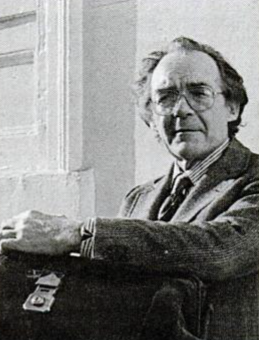
Sir John Royden Maddox, FRS was a Welsh theoretical chemist, physicist, and science writer. He was an editor of Nature for 22 years, from 1966 to 1973 and 1980 to 1995.
Anthony James Trewavas FRS FRSE is Emeritus Professor in the School of Biological Sciences of the University of Edinburgh best known for his research in the fields of plant physiology and molecular biology. His research investigates plant behaviour.
Philip John Diamond is a Professor in the School of Physics and Astronomy at the University of Manchester. He was the director of the Jodrell Bank Centre for Astrophysics from 1 October 2006 until 2010. He was the Chief of CSIRO's Astronomy and Space Sciences Division from 1 June 2010 and in October 2012 he left CSIRO to become the Director General of the Square Kilometre Array (SKA) Organisation.

Professor Anthony John Grenville Hey was vice-president of Microsoft Research Connections, a division of Microsoft Research, until his departure in 2014.

Philip Conrad James Donoghue FRS is a British palaeontologist and Professor of Palaeobiology at the University of Bristol.
Fellowship of the Institute of Physics (FInstP) is "the highest level of membership attainable" by physicists who are members of the Institute of Physics (IoP), "for those with a degree in physics or related subject and who have made a significant impact on their sector"; it is for "distinguished physicists in recognition of their accomplishments".

Jonathan Felix Ashmore is a British physicist and Bernard Katz Professor of Biophysics at University College London.

David Thomas Delpy,, is a British bioengineer, and Hamamatsu Professor of Medical Photonics, at University College London.
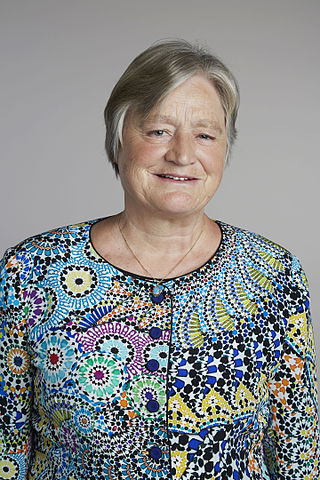
Julia Mary Slingo is a British meteorologist and climate scientist. She was Chief Scientist at the Met Office from 2009 until 2016. She is also a visiting professor in the Department of Meteorology at the University of Reading, where she held, prior to appointment to the Met Office, the positions of Director of Climate Research in the Natural Environment Research Council (NERC) National Centre for Atmospheric Science and founding director of the Walker Institute for Climate System Research.

Miles John Padgett is a Royal Society Research Professor of Optics in the School of Physics and Astronomy at the University of Glasgow. He has held the Kelvin Chair of Natural Philosophy since 2011 and served as Vice Principal for research at Glasgow from 2014 to 2020.

Jenny Nelson is Professor of Physics in the Blackett Laboratory and Head of the Climate change mitigation team at the Grantham Institute - Climate Change and Environment at Imperial College London.
Yvonne Elsworth FRS FInstP FRAS is an Irish physicist, Professor of Helioseismology and Poynting Professor of Physics in the School of Physics and Astronomy at the University of Birmingham. Elsworth was until 2015 also the Head of the Birmingham Solar Oscillations Network (BiSON), the longest running helioseismology network with data covering well over three solar cycles.
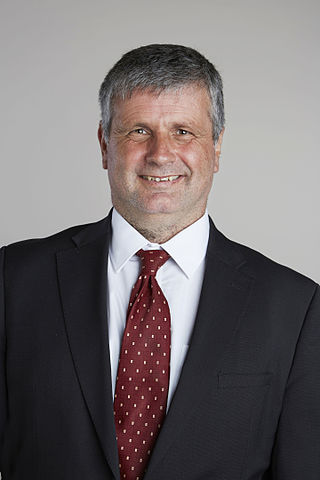
Andrew Peter Mackenzie is a director of Physics of Quantum Materials at the Max Planck Institute for Chemical Physics of Solids in Dresden, Germany and Professor of Condensed Matter Physics at the University of St Andrews, Scotland. He became a co-editor of the Annual Review of Condensed Matter Physics as of 2020.

Magdalena Skipper is a British geneticist and the editor-in-chief of the journal Nature. She previously served as an editor of Nature Reviews Genetics and the open access journal Nature Communications.
Richard Anthony Lewis JonesFInstP FLSW is professor of Materials Physics and Innovation Policy at the University of Manchester having been professor of physics at the University of Sheffield until 2020.
Nature's 10 is an annual listicle of ten "people who mattered" in science, produced by the scientific journal Nature. Nominees have made a significant impact in science either for good or for bad. Reporters and editorial staff at Nature judge nominees to have had "a significant impact on the world, or their position in the world may have had an important impact on science". Short biographical profiles describe the people behind some of the year's most important discoveries and events. Alongside the ten, five "ones to watch" for the following year are also listed.
Andrew Dawson Taylor was director of the Science and Technology Facilities Council National Laboratories – Rutherford Appleton Laboratory, Daresbury Laboratory, and the UK Astronomy Technology Centre in Edinburgh until his retirement in 2019.
